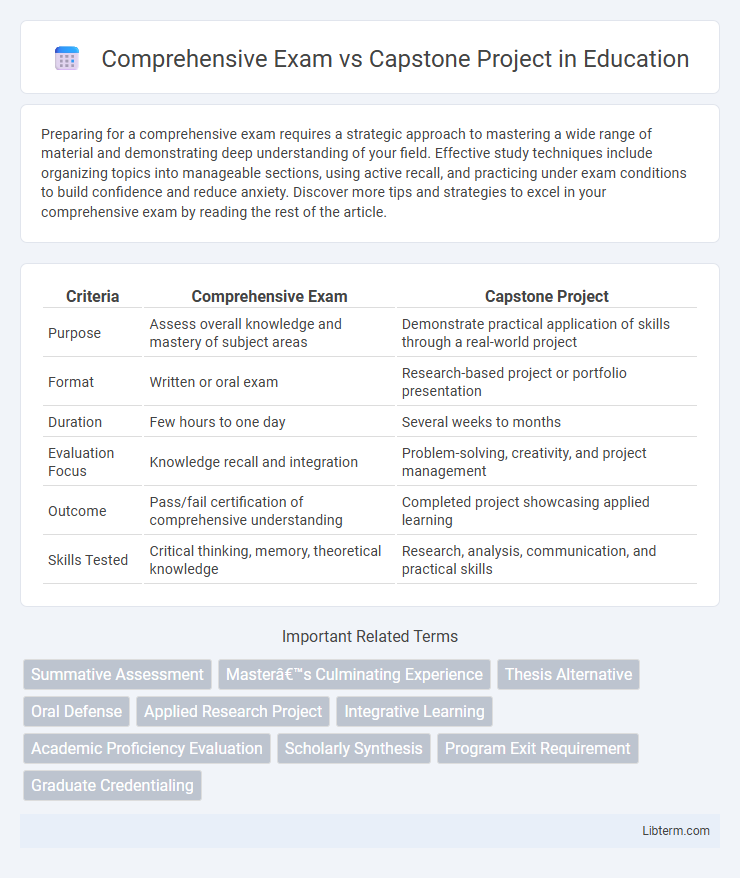Preparing for a comprehensive exam requires a strategic approach to mastering a wide range of material and demonstrating deep understanding of your field. Effective study techniques include organizing topics into manageable sections, using active recall, and practicing under exam conditions to build confidence and reduce anxiety. Discover more tips and strategies to excel in your comprehensive exam by reading the rest of the article.
Table of Comparison
| Criteria | Comprehensive Exam | Capstone Project |
|---|---|---|
| Purpose | Assess overall knowledge and mastery of subject areas | Demonstrate practical application of skills through a real-world project |
| Format | Written or oral exam | Research-based project or portfolio presentation |
| Duration | Few hours to one day | Several weeks to months |
| Evaluation Focus | Knowledge recall and integration | Problem-solving, creativity, and project management |
| Outcome | Pass/fail certification of comprehensive understanding | Completed project showcasing applied learning |
| Skills Tested | Critical thinking, memory, theoretical knowledge | Research, analysis, communication, and practical skills |
Introduction to Comprehensive Exams and Capstone Projects
Comprehensive exams evaluate a student's mastery across their entire field of study through a series of rigorous, standardized assessments, ensuring readiness for professional practice or advanced research. Capstone projects require students to apply their knowledge by completing a practical, often research-driven project that addresses real-world problems within their discipline. Both serve to synthesize learning but differ fundamentally in format, with comprehensive exams emphasizing broad theoretical understanding and capstone projects focusing on practical application and problem-solving skills.
Key Differences Between Comprehensive Exams and Capstone Projects
Comprehensive exams assess a student's mastery of core knowledge across their academic program through standardized testing, while capstone projects require the application of knowledge in a practical, often research-based or creative project. Comprehensive exams emphasize breadth of understanding and recall, whereas capstone projects highlight depth of inquiry, problem-solving skills, and real-world application. Timeframes also differ, with comprehensive exams typically completed in a single session or series of tests, and capstone projects spanning multiple months involving extensive research or development.
Purpose and Objectives of Each Assessment
The Comprehensive Exam evaluates a student's mastery of core knowledge and theoretical understanding across their discipline, aiming to ensure readiness for professional practice or advanced study. The Capstone Project emphasizes the application of acquired skills to real-world problems, requiring students to integrate and synthesize knowledge through practical, often interdisciplinary, projects. Both assessments serve distinct roles in validating academic competence, with the exam focusing on conceptual comprehension and the project on experiential learning outcomes.
Structure and Format: Comprehensive Exam vs Capstone Project
The Comprehensive Exam typically consists of a series of timed, written or oral assessments designed to test a student's mastery of core knowledge across multiple subjects, usually structured around key topics and predetermined questions. In contrast, the Capstone Project involves a practical, research-based assignment that culminates in a detailed report or presentation, emphasizing application, analysis, and synthesis of knowledge in a real-world context. While the Comprehensive Exam is format-driven with formal exam conditions, the Capstone Project allows flexible formats such as case studies, design projects, or empirical research, often evaluated through rubrics emphasizing critical thinking and problem-solving.
Skills Assessed in Comprehensive Exams and Capstone Projects
Comprehensive exams primarily assess a student's mastery of core knowledge, critical thinking, and problem-solving skills across their entire field of study, ensuring readiness for advanced professional or academic work. Capstone projects evaluate practical application, creativity, and the ability to integrate interdisciplinary skills by requiring students to design, implement, and present real-world solutions or research findings. Both assessments emphasize analytical reasoning and subject expertise, but capstone projects place greater focus on project management, teamwork, and communication skills.
Time Commitment and Preparation Required
Comprehensive exams typically demand extensive study over several weeks to months, focusing on mastering core concepts and synthesizing cumulative knowledge from the entire program. Capstone projects require sustained effort across a longer period, often a semester or more, involving in-depth research, practical application, and iterative development of a final deliverable. Time commitment for comprehensive exams centers on intensive review and memorization, while capstone projects emphasize ongoing project management, problem-solving, and collaboration skills.
Pros and Cons of Comprehensive Exams
Comprehensive exams offer a structured evaluation of a student's mastery over core subjects, ensuring a broad understanding and readiness for advanced academic or professional work. They can induce significant stress and may emphasize rote memorization over practical application, potentially limiting creative problem-solving skills. While comprehensive exams are efficient for assessing knowledge quickly, they may not provide the same depth of project-based learning or real-world experience gained through capstone projects.
Pros and Cons of Capstone Projects
Capstone projects provide practical experience by allowing students to apply theoretical knowledge to real-world problems, enhancing critical thinking and problem-solving skills. They often involve collaboration, fostering teamwork and communication abilities, but can be time-consuming and require extensive self-motivation and project management. However, unlike comprehensive exams, which test broad theoretical understanding in a controlled environment, capstone projects may lack standardized evaluation and can vary significantly in scope and depth across disciplines.
Choosing the Right Path: Factors to Consider
When choosing between a comprehensive exam and a capstone project, consider your learning style and career goals. Comprehensive exams focus on demonstrating broad knowledge through rigorous testing, ideal for students aiming for academic or research careers. Capstone projects emphasize practical application and problem-solving skills, benefiting those pursuing industry roles or hands-on experience.
Conclusion: Which Assessment Fits Your Academic Goals?
Choosing between a comprehensive exam and a capstone project depends on your academic goals and career aspirations. Comprehensive exams are ideal for students seeking to demonstrate broad knowledge mastery, particularly those targeting academic or research-oriented careers. Capstone projects suit students aiming to apply practical skills and produce tangible work, aligning with professional development and real-world problem-solving objectives.
Comprehensive Exam Infographic

 libterm.com
libterm.com